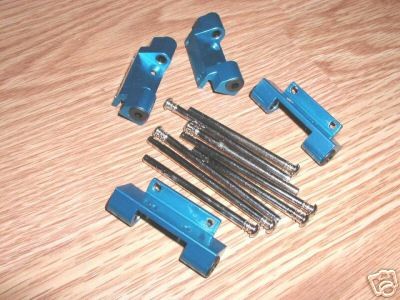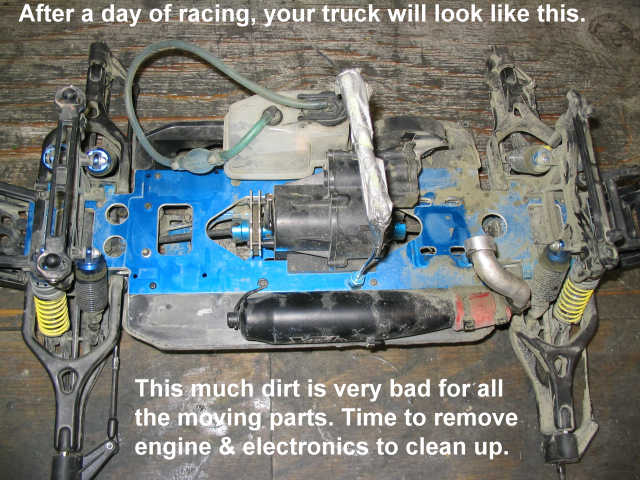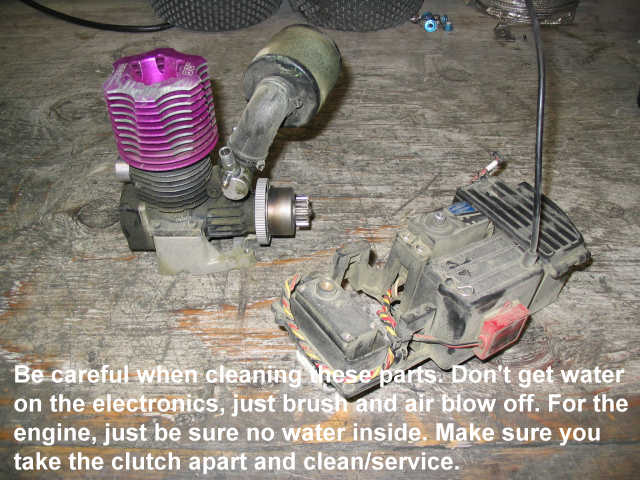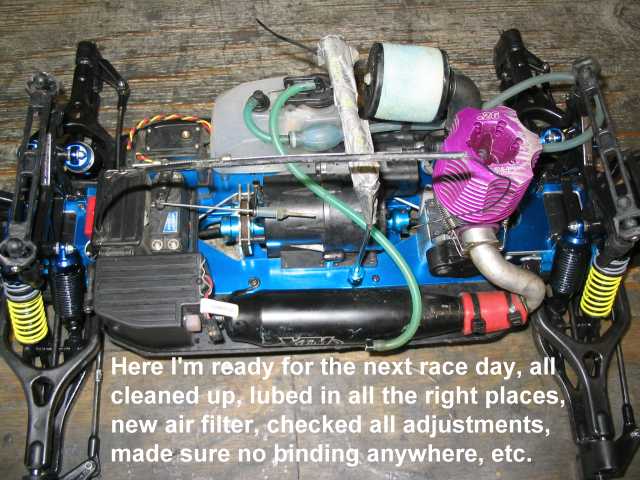|


















| |
OK, there's a lot of info here. The bottom line is this: YOU NEED TO HAVE
YOUR TRUCK SETUP PERFECTLY. You can be the best driver in the whole galaxy, but
if there's something wrong with the setup, then you ain't gonna win, simple as
that. Even a mediocre driver can win if his truck is setup better than the next
guy, so PAY ATTENTION TO DETAILS. Keep experimenting and learning.
The key with any changes is to watch your lap times. Make a change, then
race your heat (or run a few solo laps) and look at your lap times. Don't bother
with average lap times as a crash or two is probably factored in. You want to
check your best 2 or 3 lap times in any given session, then make a change, and
compare new best 2 or 3 lap times against other best laps. Usually best to make
one change at a time, then study lap times to see if better or worse.
CHASSIS/SUSPENSION
 |
Steering Servo - Get a
great steering servo, like a 94358 Airtronics. This is one of
the very best improvements you can make to your truck, so do this first! Then
move the stock steering servo to the brake/throttle position.
|
 | FOC - Use the FOC
(forward only conversion) kit. This saves a lot of weight. Lighten things up
wherever possible.
|
 |
Camber & Toe - Set
camber at around -2. Rear toe-in around 2. In front, use a little toe-out.
Experiment with these
settings. Refer to the Off-Road Tuning page and the
Set-Up Guide on this page.
|
 | Spare Parts
- Keep plenty of
spare parts on hand. I bought a used MGT off eBay so I have a complete rolling
chassis available to grab whatever parts I might need.
|
 | Tires
-
UPDATE 4/5/06, maybe try some of the new Crime Fighter MT, BowTie MT, Dirt
Bonz or Panther Boas MS tires. I have all kinds of tires to try this season,
but have not evaluated them enough to make a valid recommendation. Also, I
recommend gluing the foams to the wheels to reduce side flexing. Proline Bowties 40 series tires and rims
have always worked good for me, but they're big and heavy. This year (2006
season) I am trying to reduce unsprung weight, so lighter tires and wheels are
a must, plus I switched to Ti pillow balls.. You will see on my MAXIMUM Steering
page that the tightest turning radius comes from Wide Off-Set T-Maxx style
wheels. Speaking of wheels
and tires, they will loosen up on you. When that happens, you will immediately
strip out the wheel. The solution (for 14mm hexes) is to use two wheel nuts. Add a small
amount of blue (medium) loctite too. No more loose wheels! If you do strip a
wheel, then simple epoxy the metal hex right into the wheel. Of course, best
solution may be 23mm wheels.
|
 |
GEARING - Bowties 40 series with a Picco .26; good combo is 17t clutch bell, 52t spur. If
you need more low-end I go to
16/52. If you change tires you may need to re-gear a couple teeth. 17/52 with the stock tires and a Picco .26 works good too. It's
cheaper to change gearing by buying spur gears than clutch bells. So, if
you're running 16/52 and you want more top speed, then buy a 49t spur.
|
 |
Springs/shocks - Powerstrokes versus stock......................
Powerstrokes - Early this
past season (2005) I (Chevy-SS) was racing at a track with a tough whoops section. My MGT was very
touchy in the whoops with the stock shocks. The suspension could not react
quick enough. The next week, I put on the new Powerstrokes and I could take
the whoops at full speed. It was a real noticeable difference. Initially, I
used the stock setup, which was the red/yellow springs and the 30w oil. This
was very soft, but man, it really just soaked up the rough stuff like I was
floating on air. A softer suspension is a little harder to drive, but I kept
it like that for a couple of weeks. I eventually had to stiffen it up
a bit as there was a little too much bottoming out. Now I use gray on the
primary spring (small one) and yellow for the secondary (big one). I run 40w
in the coilovers and 50w in the bypass shocks. So I would recommend the
gray/yellow, with 40/50 oils. I mount the shocks in the outer holes on lower
arms and set suspension at "bones level". That should be a good starting
point.
Stock Shocks - For stock shocks, try red/gold spring combo on each corner as a
starting point. Upgrade to the FT aluminum caps, especially for the front. For stock shocks, try 45w oil,
don't vary too much from that. Don't
set suspension too stiff on a rough track. This will make the truck bounce too
much.
Set initial ride height at "bones level", that is, when you drop front end (or
rear) and let hit it should rebound to a point where the dogbones are level to
the eye. The suspension/shocks should be set up so you can drop it from about
18 inches (with low-profile tires) and have it land and just spring back to bones level, without
bottoming out.
Experiment with
these shock settings. There is no such thing as a perfect setup that will work
at all tracks. Refer to the Off-Road Tuning page and
the Set-Up Guide on this page.
|
 | General suspension - I prefer softer overall suspension. This gives
more traction and turning, but is a little harder to drive and jump with. I'll
tell ya though, once you get it dialed in, it will just flow through the
track. My rule is always to set suspension just hard enough so I can make the
necessary jumps.
|
 | A-Arms - (stock vs.
RPM) - I prefer the stock a-arms, as they allow more droop than RPM arms. RPM
arms will keep your truck lower, which would be good on smoother track, but
how many smooth off-road tracks have you seen? Most are rutted and very bumpy
with some good jumps too. That means you need an active suspension. You don't
want the chassis bottoming out too much (a little is OK).
|
 | DIFF
Fluid - Here's a
quote from RC Car Action magazine, Jan. '05 issue, page 46,
"This tip comes directly from Team Associated/Thunder Tiger driver Richard
Saxton. You can tune the
MGT's sealed differentials by using silicone diff fluid of different
viscosities. To improve steering, fill the rear diff with 5,000 to 10,000WT
diff fluid. Before you add the fluid, you'll need to get rid of the factory
grease that's packed into the diff. Fill the clean diff with fluid and seal
it. You can leave the front diff alone or fill it with 1,000WT diff fluid.
Either way, your truck will have more steering."
|
 | Tranny Shift Point
- This really needs to be adjusted for racing. Set so it shifts at high rpm
with a high-revving Picco .26. As said on other page, some
guys run in second gear only. If you've got a torque monster engine, then this
may work for you, but be sure you're using aluminum clutch shoes or you'll
probably melt out the stock shoes. Experiment with these settings.
|
 | Brakes -
The stock brake setup works great. Take original steering servo and move
it to the brake/throttle servo position. You can run a 15 minute main and not
notice any brake fade. It's important to make sure the brake pads are aligned
perfectly parallel to the rotor. Make sure there is no binding either, but the
clearance between pads and rotor needs to be close so the brakes will get full
power. Also, most importantly, keep the pads and rotor clean by using brake
cleaner spray (from auto store). If you get the tiniest bit of oil or fuel on
the brakes, then it's all over, you will have no stopping power. Spray them
off and you'll be like new.
|
DRIVING TIPS
 | Be smooth
- When you
drive, use just enough steering to get the truck started turning. The tendency
of most beginners is to oversteer. Don't work the wheel too much. Just let the
truck work itself through the corners. The best way is to turn and brake (or
simply decelerate) at the same time. This will move weight to the front tires
and give you tons of steering. Focus on driving a good line without crashing.
As they say, "slow is fast".
|
 | Race
your own race, don't worry about being passed, if someone faster than you is
coming up on you, let 'em by, just drive like you would want someone else to
drive.
|
 | Watch the
fastest drivers and see what line they are driving. That's where you will need
to go. You will need to be driving the best line if you want any chance of
winning.
|
 | Learn how to jump
correctly - Best results will usually be obtained by accelerating to the
proper speed and then reducing throttle just before you hit the top of the
ramp. This will give you a fairly level launch, with landing attitude being
easily controlled by a little throttle or brake. Your goal is to smoothly get
through the jump with minimum loss of time, without breaking the truck. It is
usually better to overshoot the jump a little, rather than come up short (and
maybe stuff the truck!).
|
 | Roll the throttle -
smooth driving also means to work the throttle smoothly. Don't just grab it
and stab it, roll it on smoothly (but quickly). This will help you maintain
control in all situations.
|
GENERAL SETUP TIPS
 | Ball
Ends - Keep
plenty of ball-ends on hand. The MGT eats them fast. Check them often and
replace as necessary between heats. You will need to re-check alignment after
replacing one. Put a small washer between the ball-end and retaining screw.
This will help prevent the ball-end from popping off in a crash or roll. I
have switched to Dubro Monster Ball ends, which last a lot longer than stock,
but even these super-duty ball ends wear down fairly quickly. The outer balls
wear much faster than the inner ones.
|
 | Electronics - It
goes without saying that you need upgraded steering servo (the throttle/brake
servo is OK) and radio gear. If you are trying to race with all the stock
stuff, then you are just beating your head against the wall. Additionally, get
a good NiMH battery pack, at least 1100 maH (I use 1400), and re-peak between
heats. Don't ever bother trying to race with 4 AA alkaline batteries. UPDATE 5/2/05, I am now using LiPo RX 1200maH pack
with no voltage regulator,
which weighs only 2oz, as compared to about 4oz for standard NiMH pack.
|
 | Wheel
Bearings - If loose, replace. You'll be amazed how much better the
truck handles with everything tight.
|
 | Check
It - Check and
re-check the whole dang truck between heats. Make sure it is smooth and tight.
Spin the wheels by hand. Everything should be smooth. If you hear binding or
clicking, then something is wrong. Fix it. Go over
all screws before and after you race and make sure they are tight, use loctite
on all screws that screw into metal, you will be amazed at how many come
loose.
Check your suspension for droop and binding. Make
sure your tuned pipe is attached good, it's crazy how many come off while
racing.
|
 | Clutch
Assembly - Religiously TUNE
and MAINTAIN
it. Check and/or replace the bearings every race day. If they blow out
during the main, then you've just wasted the whole day (or weekend). Make sure the clutch
bell and shoes are clean, use good degreaser like brake cleaner. Also, I like
to lighten the clutch shoes a little for more punch. Plus I really like
heavier clutch springs, like Mugen 1.1's. Once your clutch is dialed in
properly, you'll think you've installed a new engine.
|
 | Engine
- tune it good, not too lean. Fresh glow plug is recommended. Use fresh air
filters, keep spares handy. The stock engine is pretty good, but won't win you
many races. I'd move up to a .26 or larger. Lots of great engines out there.
|
|
Buy a set of these off eBay.
These are
a big problem on the MGT. When you bend one (or more) of these it kills your
handling.
If you wreck you have a good chance
of bending the upper a-arm mounts, so keep a couple spare ones on hand. When they bend, they cause binding of the a-arms, which
will kill your suspension movement and make your truck bounce all over the
track. |
 |
 | Pull
tab - put one on the fuel tank lid and cut a hole in the body so it's easy
to refuel.
|
 | Servo saver -
If you're using the aluminum Associated FT servo saver, keep an eye on it. It can loosen
up on you. Use CA glue to hold the adjuster in place, or use a nut. It will
also bind up if it gets dirty, so keep it clean or it may not save your servo
at all. You may actually need to clean the damn FT saver after every race day.
Mine gets bound up real fats. I am searching for a plastic replacement,
similar to what is used in most high-end buggies.
|
 | Check Front end - It always pays to disconnect the servo and work
the steering by hand to make sure it swings back and forth very easily. Dirt
can get in your pillow balls or steering bellcranks and bind it up.
|
 | Carefully Set
Steering - you want to get the maximum (and equal) turning possible in
order to reduce your turning radius to both sides.
Please see the MAXIMUM Steering page and
carefully go through the "Steering Tune-Up". You might want to
consider the steering mods,
which will give you tighter turning of the wheels. If
you want faster, more positive steering (great for racing), do the
two-servo steering mod from
canadian-MGT. The 2-servo steering is what I'll be running this year.
The MGT steers beautifully with 2 servos, plus the added weight helps
traction.
If you want unbelievable steering, (not good for racing though) then do the
4-wheel steering mod from TG!
Notable quote from Junior, "if someone else is running a MGT look at their truck
and see what they do, well unless they don't know what they are doing, heheh,
then maybe they'll watch you? ya never know!"
|
MAINTENANCE
Man, you gotta get used to cleaning your truck after every race day. The MGT
is really easy to clean. Just take off engine and electronics and hose her off.
This makes it real easy to check for broken, loose or binding parts.



Keep your truck clean and well-maintained and you'll be winning races just
'cause you outlasted everyone else!
GENERAL HANDLING TIPS
Need Better Jumping
(1) If bouncing too much or bottoms out over jumps, use heavier oil and/or
springs. Be careful as too stiff will cause you to lose control over rough
sections.
(2) Shock Mounting - If bottoming out over jumps move lower mount towards the
outside.
(3) Balance the Vehicle - Front to back weight. Balance is off.
Note: the opposite is true.
Need More Rear Traction
(1) Weight - Move weight towards the rear of the vehicle.
(2) Rear Ride Height - Lower rear ride height (lowers CGH of the vehicle)
(3) Rear Camber - Less camber (0 degree min.)
(4) Rear Shock Mounting - Move lower mount towards the outside one hole.
(5) Slipper - Loosen slipper so wheels don't spin too much.
(6) Rear Toe-in - Increase rear toe-in (2 degrees max)
Note: the opposite is true.
Need More Steering
(1) Weight - Move more weight towards the front of the vehicle.
(2) Front Shock Mounting - Move the lower shock mount towards the outside one
hole.
(4) Front Ride Height - Lower the front ride height (lowers CGH)
(3) Rear Shock Mounting - Move lower mount towards inside one hole.
(5) Ackerman - Use less Ackerman for more sensitive steering (short tight turns)
(6) Rear Toe-in - Decrease rear toe-in (0 min.)
Note: the opposite is true.
Need More High Speed Steering
(1) Front Toe Adjustment - More toe-in gives you more steering coming out of
the corners
(2) Rear Ride Height - Raise rear ride height for more high speed steering
(raising CGH)
Note: the opposite is true.
Make Vehicle More Stable Over Rougher Tracks
(1) Rear Camber - More negative camber is more stable on bumpy tracks
(promotes straight line driving reduces steering)
(2) Front Shock Mounting - Move lower shock mount inside for bumpy tracks
(3) Check all ball-ends and wheel bearings for slop.
(4) Check pillow balls for correct adjustment and no binding
(5) Use less viscosity shock oil, which will help keep tires in contact with
ground more
(6) Use lighter weight wheels & tires, reducing unsprung weight, which will help
keep tires in contact with ground more
Vehicle is hard to control, especially on the straights - This is where you gotta start
looking at all the small stuff. First, verify that your alignment is good for
all wheels. Then move on to the other stuff. Are the ball-ends tight with no slop? Are the
wheel bearings in good shape? Do you have a bent shock or a broken a-arm? Are
there a few loose screws that you didn't notice? Do you have a bent wheel or a
tire that has come unglued from the wheel? Is something bent or binding?
Your idea of the perfect setup is a complete neutral setup, that's
enough grip so you don't slide, but enough slide so you don't bog down.
And the vehicle has equal grip from the front wheels to the back wheels. Also,
the vehicle should be easy to control on the straights, even on a bumpy
track, and should track straight when you are on full power.
If you're still having problems, then
refer
to the Off-Road Tuning page and the
Set-Up Guide on this page.
|
![]()